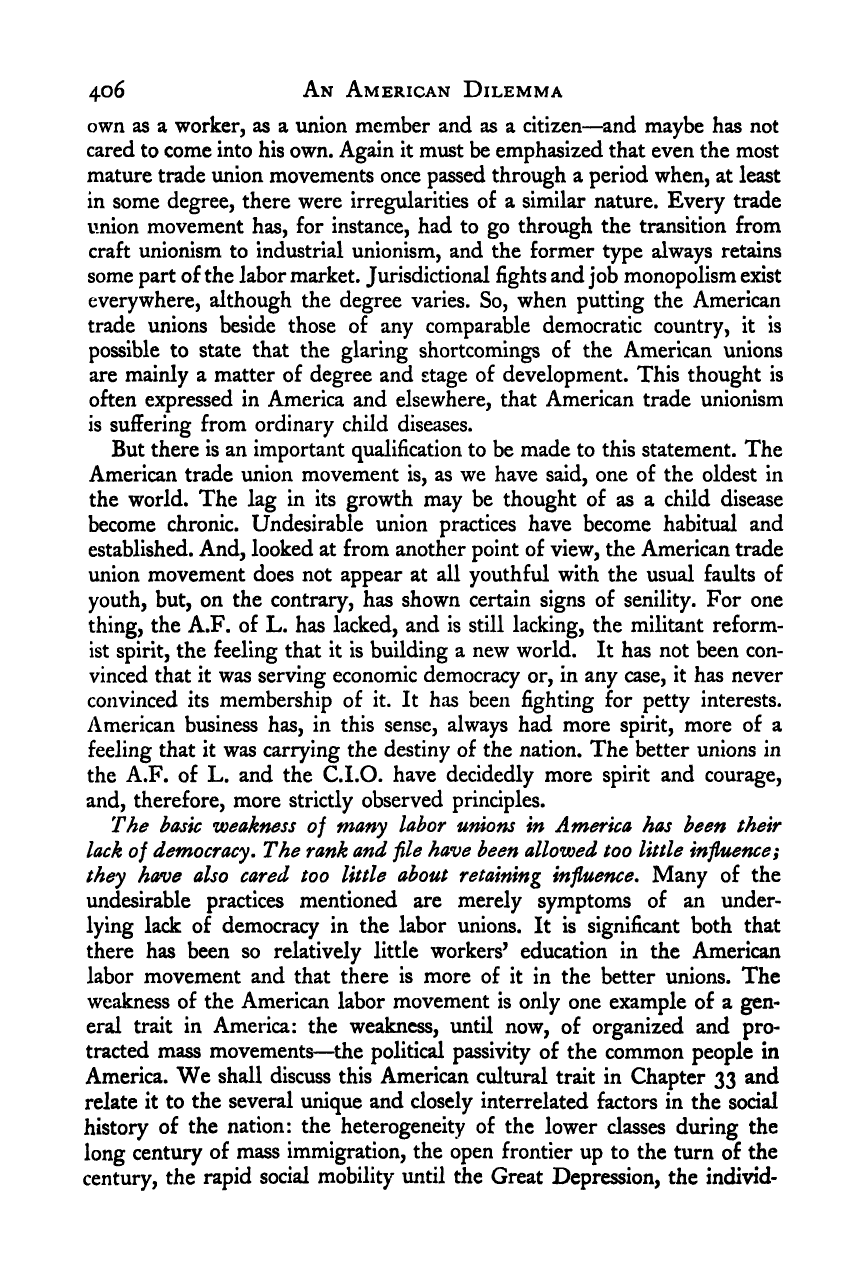Note: Gunnar Myrdal died in 1987, less than 70 years ago. Therefore, this work is protected by copyright, restricting your legal rights to reproduce it. However, you are welcome to view it on screen, as you do now. Read more about copyright.
Full resolution (TIFF) - On this page / på denna sida - IV. Economics - 18. Pre-War Labor Market Controls and Their Consequences for the Negro - 4. A Weak Movement Getting Strong Powers

<< prev. page << föreg. sida << >> nästa sida >> next page >>
Below is the raw OCR text
from the above scanned image.
Do you see an error? Proofread the page now!
Här nedan syns maskintolkade texten från faksimilbilden ovan.
Ser du något fel? Korrekturläs sidan nu!
This page has never been proofread. / Denna sida har aldrig korrekturlästs.
4o6 An American Dilemma
own as a worker, as a union member and as a citizen—^and maybe has not
cared to come into his own. Again it must be emphasized that even the most
mature trade union movements once passed through a period when, at least
in some degree, there were Irregularities of a similar nature. Every trade
union movement has, for instance, had to go through the transition from
craft unionism to industrial unionism, and the former type always retains
some part of the labor market. Jurisdictional fights and job monopolism exist
everywhere, although the degree varies. So, when putting the American
trade unions beside those of any comparable democratic country, it is
possible to state that the glaring shortcomings of the American unions
are mainly a matter of degree and stage of development. This thought is
often expressed in America and elsewhere, that American trade unionism
is suffering from ordinary child diseases.
But there is an important qualification to be made to this statement. The
American trade union movement is, as we have said, one of the oldest in
the world. The lag in its growth may be thought of as a child disease
become chronic. Undesirable union practices have become habitual and
established. And, looked at from another point of view, the American trade
union movement does not appear at all youthful with the usual faults of
youth, but, on the contrary, has shown certain signs of senility. For one
thing, the A.F, of L. has lacked, and is still lacking, the militant reform-
ist spirit, the feeling that it is building a new world. It has not been con-
vinced that it was serving economic democracy or, in any case, it has never
convinced its membership of it. It has been fighting for petty interests.
American business has, in this sense, always had more spirit, more of a
feeling that it was carrying the destiny of the nation. The better unions in
the A.F. of L. and the C.I.O. have decidedly more spirit and courage,
and, therefore, more strictly observed principles.
The basic weakness of many labor unions in America has been their
lack of democracy. The rank and fie have been allowed too little infuence;
they have also cared too little about retaining infuence. Many of the
undesirable practices mentioned are merely symptoms of an under-
lying lack of democracy in the labor unions. It is significant both that
there has been so relatively little workers^ education In the American
labor movement and that there is more of it in the better unions. The
weakness of the American labor movement is only one example of a gen-
eral trait in America: the weakness, until now, of organized and pro-
tracted mass movements—the political passivity of the common people in
America. We shall discuss this American cultural trait in Chapter 33 and
relate It to the several unique and closely interrelated factors in the social
history of the nation: the heterogeneity of the lower classes during the
long century of mass immigration, the open frontier up to the turn of the
century, the rapid social mobility until the Great Depression, the individ-
<< prev. page << föreg. sida << >> nästa sida >> next page >>